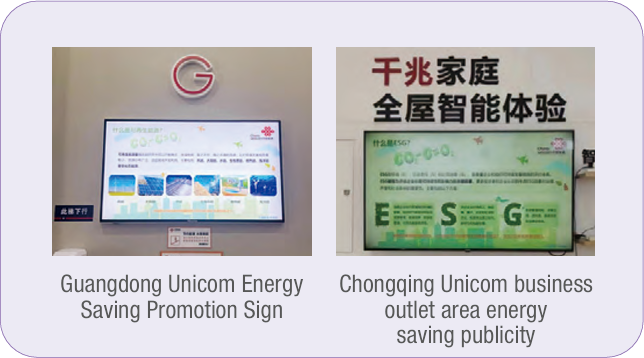- Responding to global climate change
- Continued deepening of co-build and co-share
- Enhancing the energy efficiency of network infrastructure
- Improving resource utilisation efficiency
China Unicom accelerates the green transformation of its development approach, adopting proactive strategies to address climate change, and strictly complies with the Environmental Protection Law of the People’s Republic of China and the Measures for the Supervision and Administration of Energy Conservation and Ecological Environmental Protection of Central Enterprises, among other laws and regulations related to environmental protection. It regularly assesses climate change-related risks and opportunities, and formulates environmental management goals and strategies.
China Unicom integrates green development and climate change-related issue management into the corporate governance framework. The Board of Directors, as a decision-making body, fully plays its role in leading, coordinating, guiding, and overseeing. The Company management in charge of green, low carbon initiatives, energy conservation, and emission reduction work guides the establishment and improvement of the corporate energy-saving, carbon-reduction, and climate change management system, and periodically receives reports on climate governance, energy conservation, and emission reduction efforts. Each relevant unit takes respective responsibility, jointly advancing China Unicom’s green integrated collaborative innovation capabilities to a new level.
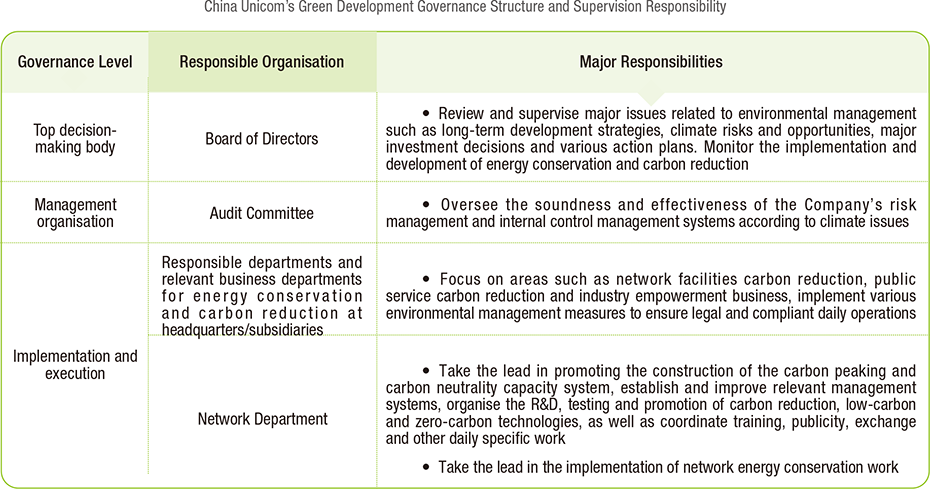
China Unicom is deeply advancing the integration of green low-carbon and digital intelligence development. Based on the original “China Unicom ‘Peak Carbon-emission, Carbon-neutrality’ 14th Five-Year Action Plan”, the “China Unicom Carbon Search Green Action Plan (2024–2025)” has been newly upgraded, implementing the new “3+5+1+1” green action plan to lead the industry’s green transformation and empower societal green development.
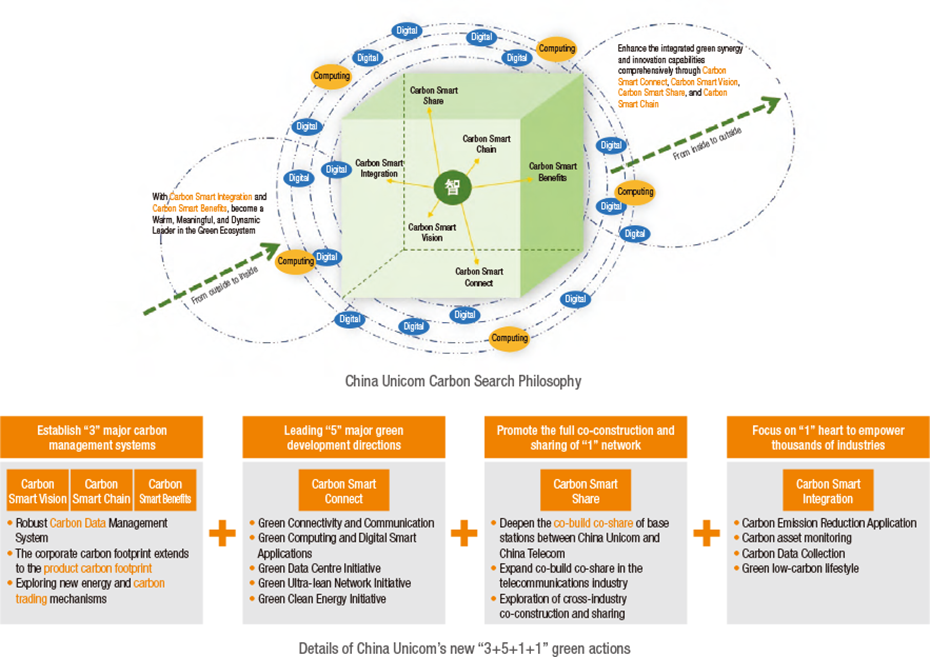
In response to the intensifying global climate change situation, China Unicom continuously strengthens the analysis, assessment, and management of risks and opportunities related to climate change. It incorporates climate change factors into the overall risk management process, conducts a comprehensive analysis of energy consumption information alongside the Company’s overall development goals and operational conditions, and organises annual climate change risk identification assessments to formulate climate risk response measures.
China Unicom’s Climate Change Risk and Opportunity Identification Process
- Collecting information on climate change-related risks and opportunities. Taking into account factors such as policies, regulations, strategies, technology, operations, and market, the Company collects, compiles, categorises, and evaluates relevant information.
- Assessing the impact of climate change. The Company evaluates the substantive impact of extreme weather conditions (such as earthquakes, floods, etc.) on communication network security, and analyses the types, scope, intensity, timing, and possibility of such impacts.
- Establishing a risk and opportunity matrix. Based on the likelihood and impact of climate change, the Company establishes a risk and opportunity matrix, and organises each professional department to identify related risks and opportunities according to categories such as network security operation and energy efficiency improvement, and changes in customer usage demands.
- Determining management methods and resource investment. Focusing on its overall development goals, the Company formulates a special plan for carbon peaking and carbon neutrality, promoting implementation from aspects such as dual carbon management, technological energy saving, and renewable energy application, scientifically and reasonably determining management methods and investment in energy-saving renovation projects.
- Defining substantial impact. Based on the scope, extent, and frequency of the impact, combined with relevant policy guidance and technology remediation development forecasts, the Company organises relevant professional departments to conduct a comprehensive assessment to define the substance of the impact.
Assessment results and countermeasures for climate change risks and opportunities
- In response to significant climate risks and opportunities, the Company conducted an in-depth assessment of the potential impact intensity, scope, and timing of various climate risks, as well as the possible financial implications for the business. A total of five risks and two opportunities were identified, with response measures formulated for each. The Company continuously improves its environmental management system, with several subsidiaries obtaining ISO 14001 certification. Among them, the short-term time range is 0 to 1 year, the medium-term is 1 to 5 years, and the long-term is over 5 years.
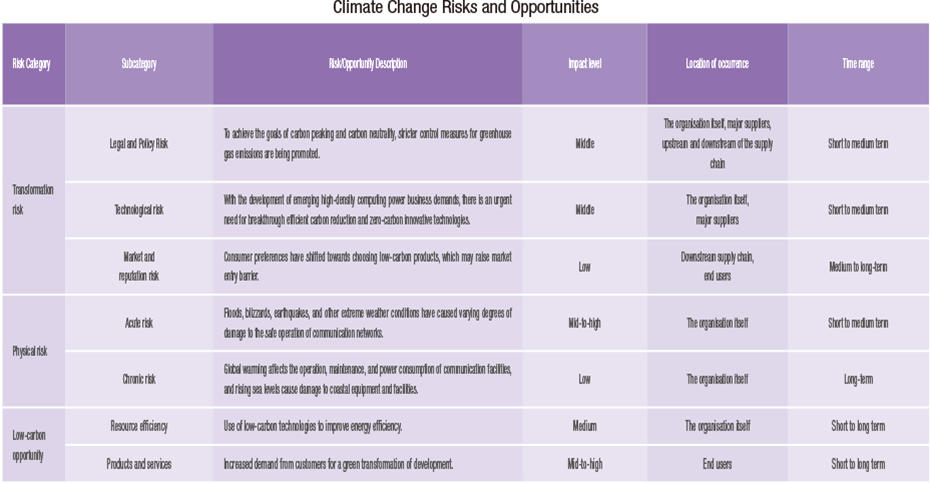
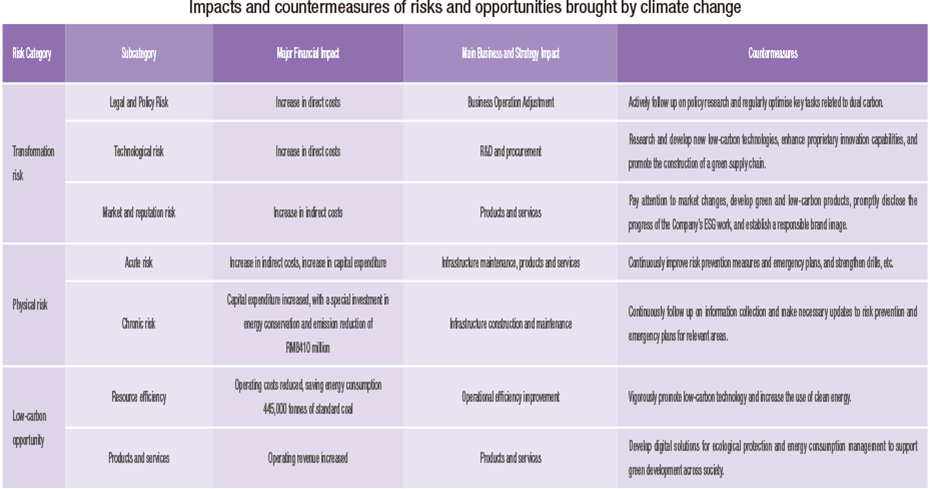
To ensure the effective implementation of the aforementioned response measures, the Company allocates resources to support talent development, assessment, and incentives, and establishes an emergency response plan for unexpected environmental incidents.
- The Company strengthens the talent pipeline in the field of green development, reasonably plans the talent structure, incorporates green development, energy-saving technologies, carbon peaking and carbon neutrality into training programmes, and focuses on enhancing the capabilities of the green development talent team.
- The Company establishes and improves the comprehensive assessment and evaluation mechanism for corporate green development and dual-carbon management, enhances the internal indicator warning and reporting mechanism, and incorporates carbon peak and carbon neutrality work into the assessment and evaluation system of branch (subsidiary) companies, clarifies the assessment rules, and strictly holds accountable and deducts points for negative incidents such as data falsification and environmental violations.
- The Company establishes an incentive mechanism for energy conservation and emission reduction management. Units with outstanding achievements in energy conservation and emission reduction will be commended and rewarded by the headquarters, and appropriate investment preference policies will be provided as necessary.
- An emergency response plan for environmental incidents has been established, and no issues of violations of laws and regulations in the environmental field occurred in 2024. The Company establishes and improves the system for identifying and addressing environmental safety hazards, conducts emergency drills, enhances early warning capabilities, and continuously refines the environmental management process from emergency preparedness, emergency response, post-event recovery, to information disclosure.
Scenario Simulation Analysis
To understand the potential impact of climate change risks on network facilities and business operations, and to assess adaptive capacity, the Company has established a scenario analysis framework to evaluate according to five types of climate scenarios.
Scenario 1: Extreme weather such as floods, snowstorms, and earthquakes impact the safe operation of communication networks.
Scenario 2: Chronic climate changes such as persistent high temperatures, changes in rainfall patterns, and rising sea levels caused by global warming impact the safe operation of communication networks in coastal areas.

Scenario 3: Extreme weather such as floods, snowstorms, and earthquakes affect subscribers travel, logistics distribution, and physical store operations.
Scenario 4: The popularisation of new green and low-carbon technologies impacts energy-saving retrofits and asset acquisitions.
Scenario 5: The growing demand from customers for industrial energy consumption management, digital empowerment of environmental governance, and green smart cities impacts the development of new products and new businesses.
The Company’s greenhouse gas emissions are primarily associated with production and operational activities such as network operations, office and business operations, heating, canteens, and official vehicles. The main indicators used to measure and manage climate-related risks and opportunities include comprehensive energy consumption per unit of information flow and comprehensive energy consumption per unit of total telecommunications business volume. Among them, the type of greenhouse gas is carbon dioxide, and the sources mainly include indirect carbon dioxide emissions from electricity consumption and externally purchased heat, as well as direct carbon dioxide emissions from the consumption of petrol, diesel, natural gas, and coal.
Overall Objective
China Unicom promotes technological innovation and application in energy saving, carbon reduction, and zero carbon, elevating its green development to new heights and empowering society-wide low-carbon development to achieve significant results.
- During the “14th Five-Year Plan” period, the energy consumption and carbon emissions per unit of production capacity, as well as the energy consumption and carbon emissions per unit of revenue capacity, to improve year by year, with the increase in carbon emissions being lower than the increase in energy consumption.
- By 2025, the comprehensive energy consumption per unit of telecommunications business volume will decrease by more than 15% compared to 2020, and the comprehensive energy consumption per unit of information flow will decrease by more than 20% compared to 2020, leading the overall development target of the industry.
Overall Progress
- The comprehensive energy consumption per unit of information flow decreased to 2.02 kg standard coal/TB, representing a reduction of 27.9% compared to the end of the “13th Five-Year Plan” period.
- 22 data centres were selected as national green data centres.
- The Company improved the energy saving and emission reduction statistics monitoring and reporting system, established a comprehensive energy saving and emission reduction statistics monitoring framework in each unit, strengthened the measurement and recording of energy consumption and pollutant emissions during production and operation processes, established relevant statistical ledgers, and prepared energy saving and emission reduction reports on a semi-annual and annual basis. Beijing, Shenzhen, and other branch companies have engaged third-party organisations to verify or certify data such as the Company’s greenhouse gas emissions.
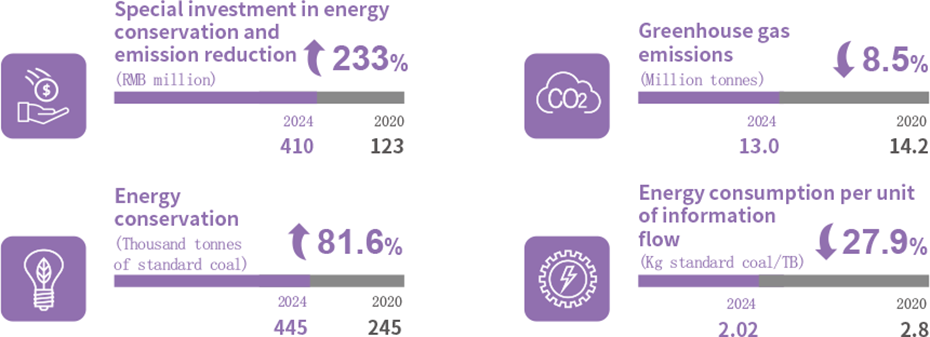
China Unicom, in collaboration with China Telecom, is advancing the co-build and co-share of 5G, 4G, and basic network resources. Together with the industry, they have achieved significant breakthroughs in shared technology, network architecture, operations, and management, providing a good example for global 5G scale construction and low-carbon emission reduction.
- Both parties jointly implemented the “Signal Upgrade”, promoted the enhancement of 5G coverage in key scenarios, advanced the deployment of 5G-A capability upgrades, and added a total of 165,000 new 5G mid-band base stations, with a cumulative total of 1.375 million in operation.
- On the basis of a single 4G mid-band network, both parties are continuously advancing the simplification of 4G low-traffic co-located sites. The number of shared 4G mid-band base stations exceeds 2 million, and over 100,000 4G stations have been simplified, effectively promoting network “reduction, quality improvement, and efficiency enhancement”.
- The Company carried out 5G-A capability upgrades, deploying carrier aggregation in key cities such as Beijing and certain hotspots, key scenarios, achieving RedCap scale coverage in over a hundred cities.

On 17 May 2024, China Unicom, together with China Mobile, China Telecom, and China Broadcasting Network, the four major telecom operators, jointly launched the commercial promotion of 5G inter-network roaming, further expanding 5G network sharing scope, reducing duplicate investment. When subscribers reach areas where the mobile number’s operator does not have 5G network coverage, such as some remote areas, they can automatically connect to other operators’ 5G networks. The entire process does not require changing SIM cards or phone numbers, and incurs no additional costs, effectively enhancing the overall efficiency of the 5G network and customer service perception.
China Unicom balances network development with safety and carbon reduction, issuing regulations such as the “Interim Measures for Energy Conservation and Emission Reduction Management of China Unicom”. It establishes a three-tier information and communication network energy-saving technology system based on network-level, site-level, and equipment-level structures. This system manages carbon emissions throughout the entire lifecycle of network planning, construction, maintenance, and operation, promoting green and low carbon development of information and communication infrastructure.
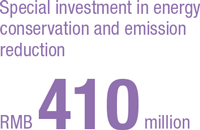
Relying on the China Unicom Carbon Search Management Platform, the Company established and improved a “dual control” indicator system of total volume and intensity that aligns with the characteristics of telecommunications operators, consolidating the foundation for energy consumption and carbon emission data management. By combining visualisation methods with digital twins and AI support, the Company laid the groundwork for the output of intelligent management strategies, enhancing the level of dual-carbon digital management.
- The Company self-developed the 4G/5G collaborative intelligent energy-saving management platform and 5G intelligent power and management system based on AI and Big Data innovative technologies, adopting multiple measures to build a green 5G network.
- The Company issued the China Unicom 6G Green Network White Paper, proposing the development vision of “Ubiquitous Intelligence and Simplicity, Green Energy and Carbon Reduction”.
- Network planning fully considered environmental protection, avoiding the ecological protection red line.
The Company actively adopted various green and low-carbon technologies to create a greener data centre operational model.

Since early 2020, China Unicom has fully implemented the streamlining of 2G and the reduction of 3G frequencies, refarming the vacated low-band and premium antenna resources to 4/5G, and launched a three-year special action for ultra-lean networks. The Company completed the creation of 61 ultra-lean network demonstration zones, with 30,000 architecture nodes consolidated nationwide, tens of thousands of outdated equipment streamlined and decommissioned, and an estimated annualised operating cost saving of RMB1.7 billion.
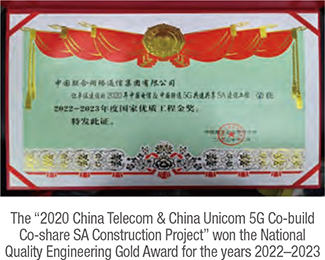
China Unicom leverages new technologies to enhance energy efficiency, self-developing power-saving and air-conditioning energy-saving technologies. “Unicom Lingbing” has applied for 9 patents, reaching an advanced domestic level. The self-developed high-efficiency energy-saving technology has been included in the “Recommended Catalogue of Energy-saving and Carbon-reduction Technologies and Equipment in the National Industrial and Information Technology Sector (2024 Edition)”.

China Unicom adheres to the circular economy principles of reduction, reuse, and recycle, enforcing strict control from the source of equipment procurement, advocating green consumption and green living concepts, promoting the use of green clean energy, and effectively enhancing the digitalization, intelligence, and greening levels of corporate operations. The Company’s production process does not involve industrial wastewater and exhaust emissions, and it is not classified as a key pollution discharge unit.
Actively responding to renewable energy development plans, the Company conducted research and pilot projects on various comprehensive energy utilisation technologies, actively participated in green electricity market trading, and advanced the deployment in carbon trading to gradually increase the proportion of renewable energy usage.
- The Company promoted the application of green clean energy, with a steady increase in the proportion of renewable energy consumption. According to equivalent sunlight duration and peak-valley electricity price differences, the Company promoted differentiated distributed photovoltaic power supply technology. We promoted pilot applications of various energy storage technologies such as lithium battery storage and vanadium redox f low battery storage, and used water-cooled energy storage technology in suitable data centres. We conducted research on comprehensive energy utilisation technologies such as waste heat recovery and multi-energy complementarity.
- The Company followed up on energy and carbon trading policies and market research. Beijing Unicom and Shenzhen Unicom have been included in the regional carbon trading market scope, conducted local carbon quota and CCER (China Certified Emission Reduction) trading, completed compliance on time, and guided green resource allocation.

The Company strictly abided by the Circular Economy Promotion Law of the People’s Republic of China and other laws and regulations, and established management systems such as the China Unicom Fixed Asset Revitalisation Management Measures and the China Unicom Obsolete Material Disposal Management Regulations. In the areas of network construction, network operation and maintenance, and office operations, fixed assets are revitalised, waste materials are meticulously managed and effectively recycled, enhancing resource utilisation efficiency.
Promoting the revitalization and utilisation of fixed assets
- The Company closely integrated investment planning, material procurement, and asset disposal with the revitalization and utilisation of fixed assets. We prioritised the use of internal revitalization methods for incremental assets, implementing measures such as internal revitalization allocation, scrap for reuse, and asset transfer. We enhanced the integration of internal resources across departments and regions to achieve resource sharing and rational utilisation.
- The Company promoted the revitalization of network-related fixed assets, regularly organised business inspections and asset stocktaking based on the Company’s overall network planning and asset efficiency to form revitalization lists, demand lists, and scrapping lists, and organised the implementation of revitalization.
- The Company promoted the revitalization of digital fixed assets, conducted testing and desensitisation of reused terminals, and utilised the asset revitalization platform to publicise inventory and manage usage, effectively improving the utilisation efficiency of hardware equipment such as servers, network devices, and terminals.
Classifying and processing waste
- The Company continuously strengthened the management of solid waste, revised and published the “China Unicom Scrap Material Disposal Management Regulations”, and regularly collected bidding information from the online bidding platforms and company-wide disposal data, categorising the status of material disposal to assist each branch (subsidiary) in improving disposal efficiency.
- The Company strengthened classification management. The generated waste was categorised by use into network type, digital type, etc., and by environmental impact into hazardous and non-hazardous waste. The hazardous waste primarily included storage batteries, fluorescent tubes, and toner cartridges, while non-hazardous waste mainly comprised office waste and telecommunications equipment and IT equipment not involving chemical waste.
- The Company continuously deepened the online auction disposal of scrapped materials, seamlessly integrated China Unicom’s supply chain platform with internet auction platforms such as Alibaba Auction and Zhongbo Auction, achieved digital collaboration, publicly released information on China Unicom’s scrapped materials, and promoted the dual circulation of internal enterprise resources and social renewable resources.
- In terms of the disposal of digital waste, a complete process has been established for assessing the reasons for material scrapping, submitting material scrapping applications, conducting technical identification and review of scrapped materials, and handling the accounting of scrapped materials. A monthly reporting and scheduling mechanism has been set up to strengthen the demagnetization and desensitisation treatment of storage media in scrapped equipment, promote closed-loop disposal of scrapped materials to prevent environmental pollution, and expedite the recovery of asset residual value.
- The Company promoted the reduction and harmless disposal of hazardous waste. When disposing of battery waste, the Company strictly followed environmental protection regulations, and had qualified recyclers with hazardous waste certificates bid for disposal. Additionally, the Company completed the transfer procedures according to local requirements. The Company recycled toner cartridges and ink cartridges, and when they could not be used, they were dismantled in a harmless manner, while materials such as metals and plastics were recycled and reused. Used lamp consumables were collected centrally by professionals for easy reuse.
- The Company strengthened the reduction and classification of non-hazardous office operational waste and advocated employees to reduce consumption at the source to minimise waste. The waste was disposed of according to the local waste classification regulations in each region. The headquarters and directly affiliated units adhered to the relevant standards for waste classification in Beijing. After classified collection, the waste was transported to the processing system for resource utilisation, incineration, or landfill. Large waste, construction waste, recyclables, and other dry waste undergo coordinated pretreatment; kitchen waste, garden waste, and other wet waste undergo coordinated resource treatment.
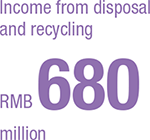
Advocating for lightweight and reduced packaging
During the renovation and modification of the Unicom business outlets, including fixtures and fittings, environmentally friendly materials are strictly selected and used. The use of packaging materials is minimised through reasonable design, with a preference for degradable materials. Centralised procurement and unified packaging are implemented, and materials are recycled and reused after project completion, striving to reduce environmental impact while ensuring quality and safety.
Promoting green consumption
The Company collaborated with multiple mobile phone manufacturers to launch the “Unicom Trade-In” service, providing users with more affordable trade-in subsidies to enhance the convenience of recycling. Users can enjoy one-stop services at offline business outlets, establishing standards in areas such as “satisfactory pricing”, “secure data”, and “hassle-free service”, thereby accelerating the participation of idle old devices in the green recycling cycle.

China Unicom advocates green office and green operations, promoting paperless office, online meetings, energy-saving renovations of office buildings, and other low-carbon measures. It encourages the concepts of green consumption and green living, creating a green and healthy office environment to reduce resource consumption in office activities.
- Enhancing the paperless service experience. China Unicom APP was upgraded to version 12.0, with 2.65 billion online transactions conducted throughout the year, issuing electronic invoices to save 19.64 million sheets of paper, enhancing service experience through green and low-carbon operations.
- Implementing paperless office. The Company implemented the digitization of official documents using the digital archive system, and continuously explored and promoted the filing and management of various types of electronic document files in a single set system.
- Strengthening water conservation management. The Company’s production process primarily uses domestic water and water-cooled air conditioning circulation water. In terms of water-saving management of the air-conditioning system, the water supply equipment adopts a tiered pump group configuration, automatically controlling the number of water pumps started, and operates with variable frequency and speed. In terms of daily water conservation management at China Unicom Building, the renovation of the building’s water system achieved 9% energy savings, and the renovation of domestic water supply pumps achieved energy savings of 2% to 5%. Rainwater and leftover drinking water are collected for recycling. Equipment maintenance and inspection are strengthened to prevent leakage. The Company establishes living waste water treatment system, pre-treats wastewater before discharge, ensuring compliance through discharge monitoring. The total water consumption for the year was approximately 15.68 million tonnes, with the headquarters and affiliated units discharging 260,000 tonnes of domestic waste.
- Strengthening office energy consumption management. China Unicom Building adopts a smart energy management system to intelligently manage daily energy consumption. Relying on the intelligent control algorithm for cold sources, the Company enhanced the data access and intelligent control levels of water, electricity, and environment, thereby reducing equipment energy consumption. The Company refined management of operation period, indoor temperature settings, etc., to reduce air conditioning energy consumption. We conducted “green lighting” activities, strengthened daily inspections and lighting management in office and public areas, and reduced lighting energy consumption.
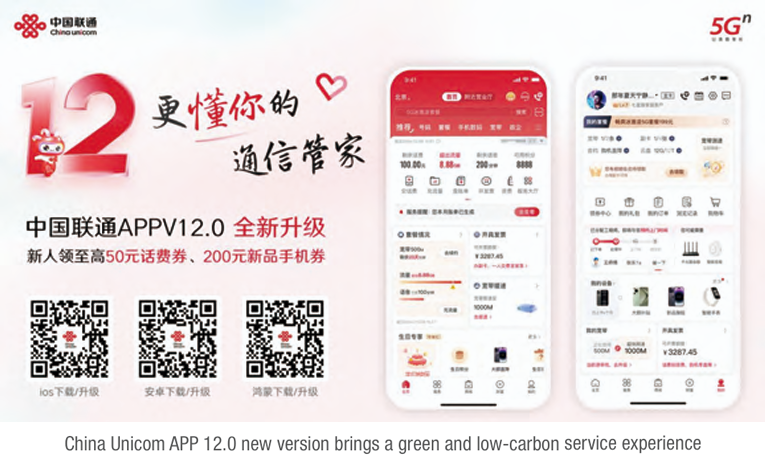
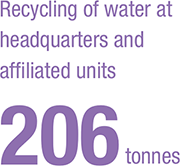
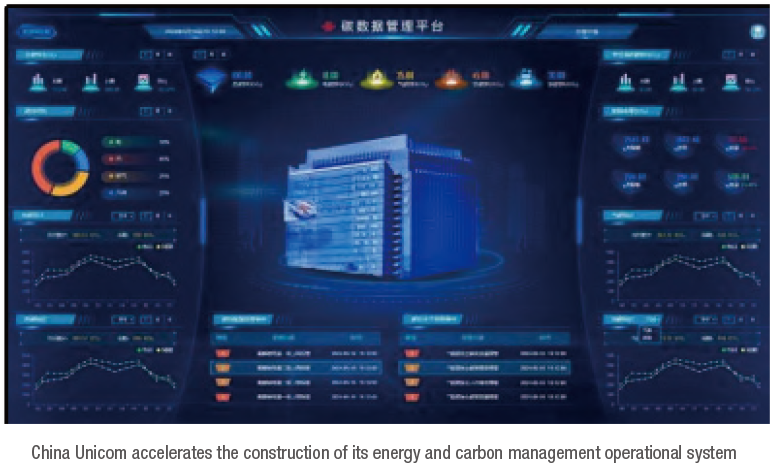
China Unicom, leveraging the account capabilities of its payment company, took the lead in launching the “Unicom Carbon Life” carbon inclusive application. The carbon emission reduction calculation model was the first to be certified by a national authoritative institution, filling the gap in the personal carbon account field within the telecommunications industry and empowering the green transformation of the lifestyle of hundreds of millions of subscribers. “Unicom Carbon Life” was selected into the “Collection of Excellent Green and Low Carbon Practises of Central Enterprises” by the SASAC of the State Council and won 11 domestic and international honours including the International Finance Forum’s “5th IFF Global Green Finance Innovation Award”.
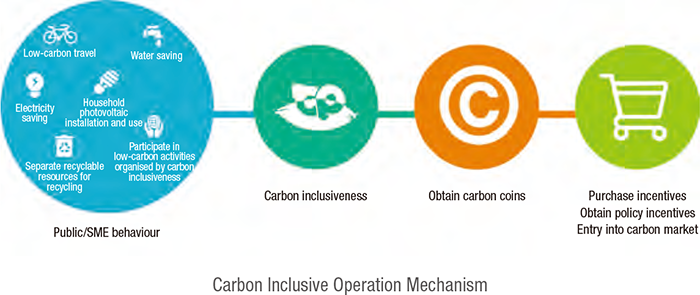
In conjunction with the themes of the National Energy Conservation Publicity Week and the National Low-carbon Day, various promotional activities were organised, including “Low-carbon Micro Experience” activities for employees. News related to the achievements in green and low-carbon development was reported by multiple media outlets such as People’s Daily Online, People’s Posts and Telecommunications News, and Sina.com. Beijing, Chongqing, and other regions sent public service SMS messages promoting energy conservation to the general public, supporting society-wide energy conservation advocacy.
